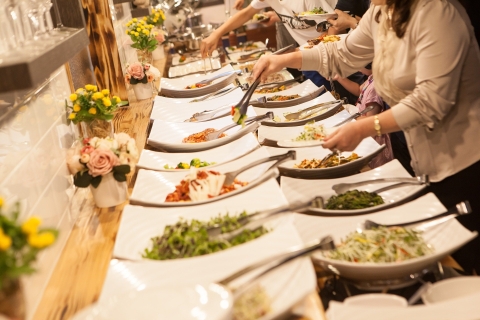The Event Buffet Isn’t Dead, But It’s Going to Be Different

The COVID-19 pandemic has event organizers rethinking every component of live events, including food and beverage. With convention centers such as Georgia World Congress Center in Atlanta winding down makeshift hospital operations as they prepare to reopen for meetings, conventions and trade shows later this year, catering companies are being forced to address every component of how they’ll serve guests again, too. But will event F&B ever be the same? What’s on the plate may look similar, but how it’s served will be forever changed.
For starters, catering teams are going to be charged with enforcing amplified safety protocols for cleanliness and safe handling of food items. One way they’ll do this is through more signage for social distancing, such as floor markers in food service areas showing where attendees can safely line up, flow markers, and signs communicating the importance of keeping distance from one another, says Paul Pettas, communications director for Centerplate, a catering operation that partners with more than 300 event venues around the country.
Safety protocols will differ in facilities across the country pending city and state regulations, but all F&B workers will wear some type of personal protective equipment (PPE), Pettas says. He predicts there will be a plexiglass barrier between customers and bartenders making drinks, as well. In the back of the house, chefs will keep the same attire and continue the safety procedures they’ve always practiced, but this will be “bumped up” a notch, he adds.
But what about buffets — is that old model of distributing food to the masses gone for good? Pettas says not necessarily. “I think we will continue to see [buffets] as an option, but it will be a mixed bag,” he predicts. “It’s going to be more focused on consumer confidence: Whatever [meal setup] we feel gives them the most confidence, we’ll do that.”
He adds that Centerplate will ramp up its grab-and-go offerings, providing more prepackaged food items for attendees. The company also plans to increase mobile ordering options, particularly for trade show booths, and offer more cashless payment options at food court locations within convention centers and other venues.
Karen Tucker, board member with the National Association for Catering & Events, points to the fact that buffet setups post-COVID will be much more time consuming. What may have taken a few minutes in line at a food station in the past will take much longer when attendees aren’t able to help themselves, she notes. Tucker also predicts more caterers will be translating the concepts of passed hors d'oeuvres, such as one-bite appetizers, and shared charcuterie plates, into individual small plates, which will also take more time to distribute.
For event organizers, these changes may require adjustments to the event agenda, including allotting more time for meals and increasing communication with attendees to explain how these experiences will work. It may also mean cutting back on attendance, or booking more event space for meals to accommodate fewer seats per table due to social distancing guidelines, Pettas says.
It’s going to be a challenge for catering and venue teams to maintain a level of personalized service with guests, at least at first. After all, being handed your plate by servers wearing masks and gloves, or interacting with a bartender from behind plexiglass, doesn’t exactly feel personal.
“Sure, there will be an adjustment period for everyone involved,” says Pettas. “But at the end of the day, I think all of these changes and safety upgrades are for the betterment of the public interest There will be certain things we’ll have to get used to — such as fewer seats at a table for a sit-down experience — but [attendees] and staff will understand that, and still find a way to make it a memorable experience.”
What’s your take on the future of event F&B? How are you adjusting your plans for future meals and serving styles? Share with us in the comments below.


Add new comment